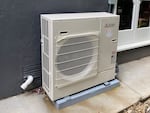Oregon has begun providing incentives for heat pumps to accelerate the clean energy transition for a key demographic — renters.
The state Department of Energy recently launched the Oregon Rental Home Heat Pump program. It provides rebates to landlords installing energy efficient heat pumps and electrical upgrades from approved contractors to rental properties. Tenants living in rented rooms, houses, apartment buildings, manufactured homes and recreational vehicles qualify.

Heat pumps can work for both heating and cooling. You can think of a heat pump as an air conditioner that can also work backwards.
Julia Simon / NPR
The program was created last year under state Senate Bill 1536, after extreme high temperatures from the 2021 heatdome event killed at least 96 Oregonians.
ODOE’s senior incentive program analyst Doug Baer said the intent is to provide renters relief during extreme weather events. It could also help lower energy bills.
“We want to be sure that during an extreme heat event, someone has the ability to cool, whether it’s a living space or a living room or a bedroom,” he said. “You can go to this certain part of your space and find some survivable cool area.”
Many people who died from heat-related illnesses in the 2021 heat dome were alone in their homes without air cooling units. As the climate crisis worsens and more extreme weather events occur, heat pump programs are essential — especially for renters. Renters are more vulnerable to extreme weather events because they can’t always upgrade their rented spaces, and they are mostly left out of the billions in federal rebates aimed at climate action for homeowners.
Before the program, Baer said landlords did not have incentives to install heat pumps or AC units for their renters.
Baer said there also were safety issues for renters who installed their own AC window units. Older homes may not have been able to handle the additional electrical load, or an unsecured window unit could potentially fall and injure someone.
“It was actually forbidden in many places, so they couldn’t put in a window air conditioner or something like that,” he said. “Many rented dwellings simply had no cooling facility.”
Now, he said, any space can qualify, except for hotels, hostels or short-term units like Airbnbs.
Rebates for the program vary. Landlords can get up to $5,000 for installing an energy efficient heat pumps to a home. Additional incentives are available if the tenant is considered low- or moderate-income. For a manufactured dwelling or RV, incentives can go as high as $7,000.
Rebates can also apply to the entire electrical and HVAC system, if needed.
“Say a house has an existing furnace and it needs modifications, or the duct work needs modifications, we have two components of the program,” Baer said. “Rebates for the heat pump and equipment, also a grant for upgrades to either mechanical or electrical type components that facilitate operation of the heat pump.”
Last month, lawmakers passed the Climate Resilience Package, a $90 million investment for climate action that could return $1 billion in federal funds. The package is a compilation of bills focused on community resilience, adaptation and reducing the state’s greenhouse gas emissions in the building sector.
State Rep. Pam Marsh, D-Ashland, worked with several lawmakers to help create and pass legislation in the package.
She said the cooling unit rebate program is a step forward for climate action and resiliency. She said it ensures all residents can benefit from better energy efficiency.
“Conventional energy efficiency programs have been aimed at homeowners, since renters can’t justify or afford to make investments in units they don’t own,” she said in an emailed statement. “That means that the 40% of us who are tenants often live in homes with inefficient heating and cooling systems and sky high utility bills.”
Marsh, who is the chair of the Oregon House Committee on Climate, Energy and the Environment, said the program provides landlords support to help finance what could be significant upgrades for their tenants.
The program works directly with contractors. Landlords must contact approved contractors to begin a project. The rebate will be paid to the contractor who will then pass the savings to the homeowner.
Robert Hamerly, the chief executive officer of Greensavers, one of the approved contractors from ODOE’s list, said he already has a few clients beginning the process.
“We’re hoping to run a couple of these projects through that we have on our radar already, learn what we can from that experience, and then come up with an outreach strategy,” he said.
It is a learning process on both sides, since it’s a new program, Hamerly said. Fully understanding the process makes it successful and more enticing to landlords.
Hamerly also said there is still a lot more to do to help renters.
“Even 10% or 20% of the apartments that need it, get it, then we’re way better off than we were prior,” he said.
Correction: An earlier version of this story misstated which types of equipment could receive rebates. The program only provides incentives for heat pump units. OPB regrets the error.
